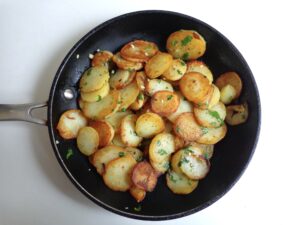
Skillet-fried potatoes with garlic and parsley
These garlicky potatoes take their name from the town of Sarlat in southwest France, where they are typically cooked in duck or goose fat. Since that may be readily available, this recipe provides an alternative in which the potatoes are cooked in butter and oil. Finely minced garlic and parsley are added at the very end, producing a pungent flavor.
For best results, use a variety of potato that holds together while cooking, such as Charlotte in France, Yukon Gold in the States or King Edward in Britain, and fry the potatoes in a large heavy-bottomed nonstick or cast iron skillet.
If you’d like to cook the potatoes in duck or goose fat, you can either purchase some online or render it yourself while cooking duck or goose for another meal (see note below). If using oil and butter, a neutral vegetable oil, such as sunflower oil, will produce more authentic results than olive oil, and it’s best to use unsalted butter.
The quantities below will serve 2-3 people.
1 pound (500 g) potatoes
2 tbsp. (50 g/1 ounce) butter
1 tbsp. vegetable oil, such as sunflower oil
OR
3 tbsp. duck or goose fat (instead of the butter and oil)
salt and freshly ground black pepper
2 cloves very fresh garlic
2 tbsp. minced parsley, preferably flat leaf
Peel the potatoes and slice them into thin rounds.
In a large skillet, heat the oil and butter or the duck fat to sizzling. Add the potatoes and sauté over medium-high heat, stirring occasionally, until the potatoes are golden brown, 20-30 minutes. The cooking time will vary according to the size of your pan.
While the potatoes are cooking, peel and finely mince the garlic. Strip the parsley leaves from their stems and mince. Combine the garlic and parsley in a small bowl.
When the potatoes are golden, sprinkle with salt to taste and grind on some black pepper. Turn off the heat, stir in the garlic-parsley mixture and serve immediately. Serves 2-3.
Note on rendering duck fat: When cooking duck, such as a magret (breast), pour off the fat into a bowl. Allow to cool to room temperature. Pour through a sieve into a clean jar. Refrigerate. The fat will keep for several months in the fridge, and you can add to the jar each time you cook duck — but be sure to allow the fat to cool before adding.




